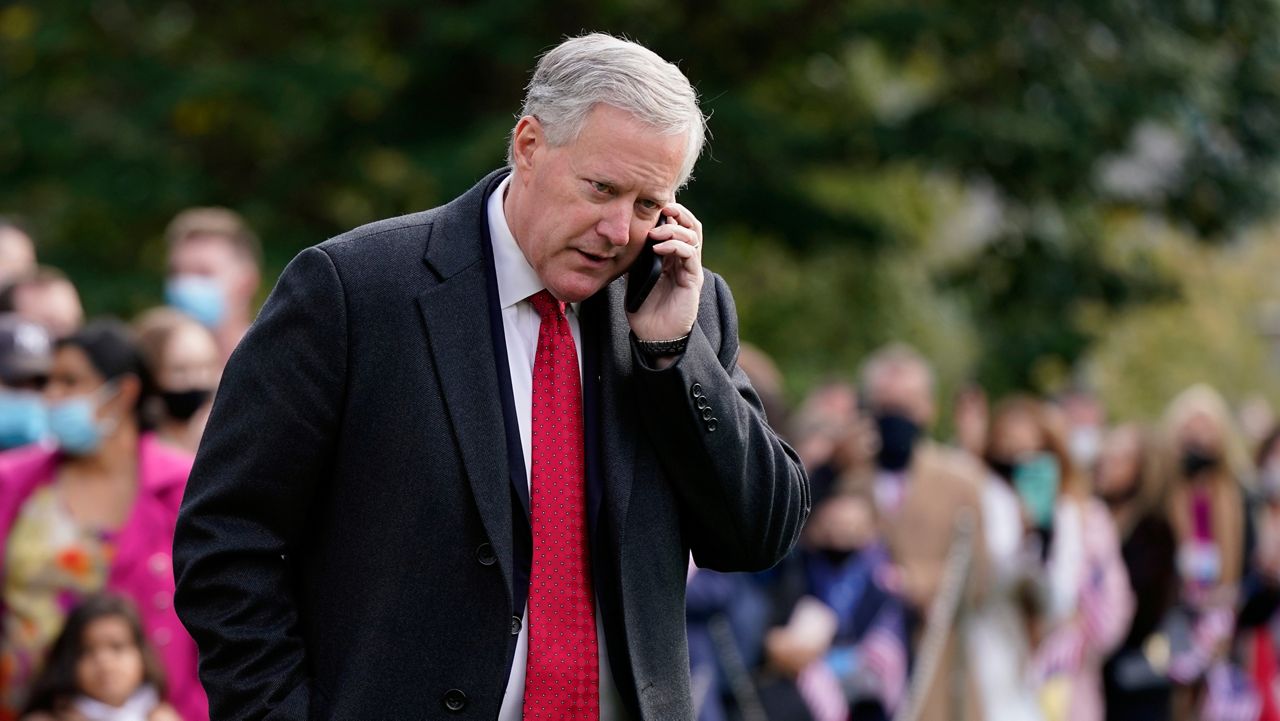Mark Meadows, former President Donald Trump's chief of staff, did not show up for a scheduled deposition before the panel investigating the Jan. 6 riot at the U.S. Capitol on Friday, setting up another possible showdown which could lead to the House recommending criminal charges.
A lawyer for Meadows said in a statement that the former chief of staff would not comply with the subpoena.
“Legal disputes are appropriately resolved by courts,” Meadows’ lawyer, George Terwilliger, said in a statement Friday morning. “It would be irresponsible for Mr. Meadows to prematurely resolve that dispute by voluntarily waiving privileges that are at the heart of those legal issues.”
The panel has not yet commented on the path forward.
Meadows’ refusal to comply comes amid escalating legal battles between the committee and Trump, who has claimed privilege over documents and interviews the lawmakers are demanding.
As the sitting president, Joe Biden has so far waived most of Trump’s assertions of privilege over documents, and the White House said in a letter on Thursday that Biden would also waive any privilege that would prevent Meadows from cooperating with the committee. U.S. District Judge Tanya Chutkan has also rejected Trump’s arguments, noting in one ruling this week that “Presidents are not kings, and Plaintiff is not President.”
The panel’s proceedings and attempts to gather information have been delayed as Trump appealed Chutkan’s rulings and the House fights for the information in court. On Thursday, a federal appeals court temporarily blocked the release of some of the White House records the panel is seeking, giving that court time to consider Trump’s arguments.
The appeals court will hear arguments on Tuesday, Nov. 30 in Trump’s separate case against the committee and the National Archives, an attempt to withhold documents from the panel. The arguments will take place before three judges nominated by Democratic presidents: Patricia Millett and Robert Wilkins, nominated by former President Barack Obama, and Ketanji Brown Jackson, an appointee of Biden.
The committee has subpoenaed almost three dozen people, including former White House staffers, Trump allies who strategized about how to overturn his defeat and people who organized the giant rally on the National Mall the morning of Jan. 6. While some, like Meadows and former White House aide Steve Bannon, have balked, others have spoken to the panel and provided documents.
Meadows, a former Republican congressman from North Carolina, is a key witness for the panel. He was Trump’s top aide in the time between Trump’s loss in the November election and the insurrection, and was one of several people who pressured state officials to try and overturn the results. He was also by Trump’s side during much of the time, and he could provide information about what the former president was saying and doing during the attack.
“You were the president’s chief of staff and have critical information regarding many elements of our inquiry,” the committee’s chairman, Rep. Bennie Thompson, D-Miss., wrote in a letter accompanying the Sept. 23 subpoena to Meadows. “It appears you were with or in the vicinity of President Trump on Jan. 6, had communications with the president and others on January 6 regarding events at the Capitol and are a witness regarding activities of that day.”
In a letter to Meadows’ lawyer on Thursday, Thompson wrote that failure to appear at a deposition on Friday and produce documents would be viewed by the committee as “willful non-compliance” and that the panel will consider contempt charges. Meadows would be the second of the committee’s witnesses to be held in contempt after the House voted to hold Bannon in contempt last month.
Bannon was indicted by a federal grand jury later Friday, signaling that the Justice Department is taking these matters seriously amid Congress' push to restore its subpoena power.
"Mr. Meadows’s actions today — choosing to defy the law — will force the Select Committee to consider pursuing contempt or other proceedings to enforce the subpoena," Reps. Thompson and Liz Cheney, R-Wyo., the vice chair of the committee, wrote in a statement Friday following Bannon's indictment.
"If his defiance persists and that process moves ahead, the record will reveal the wide range of matters the Select Committee wished to discuss with Mr. Meadows until his decision to hide behind the former President’s spurious claims of privilege," they continued. "Many of those matters are not even conceivably subject to any privilege claim, even if there were one."
"Indeed, Mr. Meadows has failed to answer even the most basic questions, including whether he was using a private cell phone to communicate on January 6th, and where his text messages from that day are," the two lawmakers wrote, adding: "It’s unfortunate that Mr. Meadows has chosen to join a very small group of witnesses who believe they are above the law and are defying a Select Committee subpoena outright."
"Mr. Meadows, Mr. Bannon, and others who go down this path won’t prevail in stopping the Select Committee’s effort getting answers for the American people about January 6th, making legislative recommendations to help protect our democracy, and helping ensure nothing like that day ever happens again," they added
"I certainly think this will have a chilling effect for anybody who is trying to resist" the committee's subpoenas, Illinois Rep. Adam Kinzinger, the only other Republican on the panel, said on CNN Friday.



